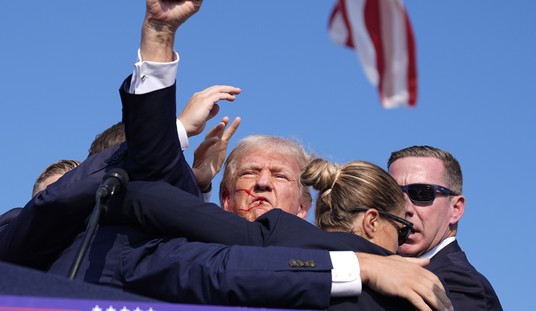The New York Times has enjoined Congress not to impose further sanctions on Iran because the administration is on the verge of a “deal”. The gist of the NYT’s argument is that after years of waiting, the chance for a diplomatic solution with Tehran is now at hand. Here is their reasoning.
Amazingly, after 34 years of mostly diplomatic silence between Iran and the United States, we are in the midst of negotiations with the potential to eliminate the threat of a nuclear-armed Iran….
under the terms of the interim agreement, the Iranians have six months to prove they are serious about this process. If they fail this test, the United States will surely act immediately to impose additional sanctions, and our international partners, understanding that we have given a negotiated approach a chance to succeed, are likely to join us.
We don’t know whether Iran can be persuaded to peacefully give up its nuclear weapons ambitions — but it is very much in our interest to give this diplomatic process every chance to succeed.
Thus we should grasp at this ‘chance for peace’ — whatever the risks — before it passes us by. There are a number of logical problems with this approach one of which might best be described by a citing an analogy.
Imagine someone is offering to buy the New York Times. The terms are that the Times hands over its assets today and the buyer has six months to prove they are serious about paying. If the buyer doesn’t pay then the Times can sue in court to repossess their building. A great deal isn’t it?
Of course it is not. It’s a terrible deal, one likely to cause more trouble than it averted; but it is precisely the kind of deal that the NYT is asking the legislature to agree to. The problem with taking Iran at its word is the general difficulty of dealing with those who have bad credit ratings. When you are dealing with someone you don’t trust or who has a record of defaulting, the only reliable method is cash on the nail. Otherwise you are bound to be taken to the cleaners.
But there is a much stronger objection to accepting a deal with Tehran largely on faith: the problem of conceding more power to Iran over the negotiating process over time. The power relationship between two parties gradually changes with the years. The question is, who is rising and who is in decline? Robert Gates, who served as Secretary of Defense under president Obama, explained how with each passing step the administration would have to up and up the ante in an interview with Hugh Hewitt.
Gates said: [Emphasis mine]
We, I think we are seeing in the Iranian’s willingness to come to the table the potential success of a strategy pursued by Presidents Clinton, Bush and Obama of ratcheting up the economic pressures on Iran to the point where it hurts so badly, the Iranian people, that their government is forced to come to the table or be at risk of having domestic turmoil. I think that’s happened. I think what’s really important is what happens in six months. And my view is that the administration ought to set a specific date. You know, they talk about six months. My view is, and what I would be arguing if I were in the Situation Room is okay, then the negotiations begin on whatever the date, January 25th or whatever. Exactly six months from then, the negotiations stop. Either they’re successful or they’re not, because the Iranians are perhaps the world’s best at slow rolling a negotiation. Well, it’s just, we’re close. Let’s do another month. Let’s do another two months. I think we ought to have a firm deadline. I think that while I oppose the imposition of additional sanctions right now, because I do think it would blow up this opportunity, I don’t see why there is opposition to the Congress passing sanctions that would be triggered at that six month point, so that in essence, the message to the Iranians is if there is no successful negotiations, an agreement at the end of six months, you are going to be significantly worse off than you were when these negotiations began. It’s not going to be a return to the status quo before the negotiations. And finally, from my standpoint, the only agreement that we ought to be willing to sign up to is one that rolls back the Iranian program to the point where they are no longer a nuclear weapon threshold state, a state that could go to a nuclear weapon relatively quickly. So I think the important agreement, it’s not that we began the negotiations that it’s a bad idea. I think that what people ought to be focused on is what happens at the other end of those negotiations, and what kind of an agreement we get. And a poor agreement is clearly far worse than no agreement at all, in my view.
The longer you wait the more you have to threaten. In other words, if the Iranians take the money and run, America would have to brandish really dire consequences in six months. Why let the customer take your product and risk his absconding in the belief you can hire a SWAT team to repossess your goods in a half year’s time. Is this wise policy? Or would it not have been better to charge him for it as he walked out the door? Who believes that in those six months the credibility of the Obama administration to act severely against Iran will have increased rather than decreased?
In all probability the Obama administration will be even less able to issue dire threats to Iran than it can today. Power will shifted in their favor over time with this agreement. This brings up something the New York Times misses entirely. Shifting power to Iran is destabilizing in itself. A bad deal actually increases the risks of war.
Students of international relations have long argued that rapid shifts in relative power can lead to war. ‘The growth of Athenian power and the fear which this caused in Sparta’ or the rise of Germany, for example, are common explanations for the Peloponnesian war and World War I, respectively.
More recently, the economic and military rise of China has led many to wonder about the likelihood of a war with its neighbors or the United States. In each case, the declining state fears that it will negotiate in a position of weakness once the balance of power has shifted, and hence it is argued, prefers fighting now.
If America is to drive an advantageous bargain now is the time. In fact the anticipation of this shift is already causing the Sunni states to arm up. Only a few days ago the Royal United Services Institute had this to say about the consequences of a deal with Iran.
The Geneva agreement envisions allowing Iran to possess a ‘mutually defined enrichment programme’, wording that represents a conditional recognition of Iran’s claimed right to enrich. If a comprehensive agreement includes Iranian enrichment to lower levels, Saudi Arabia would most likely demand exactly the same scope for its own emerging nuclear programme. Also, if the interim or a future deal confers upon Tehran a special status in the Gulf and in the wider Fertile Crescent, then it is most likely that the Kingdom would not accept it, and may pursue a regional revisionist policy to assuage its own security fears.
The deal the NYT hankers after is not some static, paradaisal state, a long-sought solution that will fix things for good. It will simply be another starting point from which, by all indications, the Sunni states will start acquiring equivalent rights to enrich uranium. The NYT makes the mistake of begging the question. They assume that all change must be for the better. They ignore the fact that up until now, both countries have not openly gone to war. The real test of the undisclosed deal is whether it will have the effect of maintaining at least that state of affairs.
And that is by no means guaranteed. The Obama administration is rapidly losing influence internationally. To use the metaphor of the movie Sunset Boulevard, if the administration is not “ready for its close-up” now it will be even less photogenic six months from today. The argument is all in favor of taking the close up now.
There is no argument that a good deal with Iran can be desirable. But can such a deal be negotiated? And if so why not throw everything into the diplomatic effort now? Taking an IOU from Tehran in the belief that a hollow agreement now can be made good by threats in the future does not look like a good deal.
Did you know that you can purchase some of these books and pamphlets by Richard Fernandez and share them with you friends? They will receive a link in their email and it will automatically give them access to a Kindle reader on their smartphone, computer or even as a web-readable document.
The War of the Words for $3.99, Understanding the crisis of the early 21st century in terms of information corruption in the financial, security and political spheres
Rebranding Christianity for $3.99, or why the truth shall make you free
The Three Conjectures at Amazon Kindle for $1.99, reflections on terrorism and the nuclear age
Storming the Castle at Amazon Kindle for $3.99, why government should get small
No Way In at Amazon Kindle $8.95, print $9.99. Fiction. A flight into peril, flashbacks to underground action.
Storm Over the South China Sea $0.99, how China is restarting history in the Pacific
Tip Jar or Subscribe or Unsubscribe










Join the conversation as a VIP Member